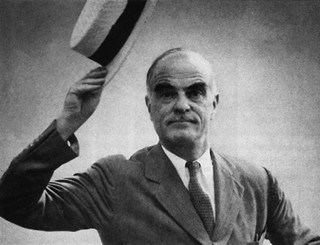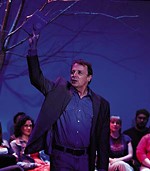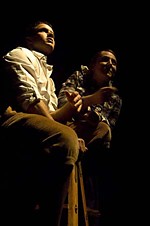Forgotten Radical
Thornton's plays are Wilder than you might remember
By Robert Faires, Fri., Nov. 20, 2009
Our Town? Oh yeah, isn't that the play in the little New England burg where a couple of squeaky-clean teens fall in love while that "aw-shucks" narrator guy goes on and on about how life there in the olden days was so swell? That's it, right? Nostalgic. Sentimental. Quaint.
Sigh.
No, that isn't the play at all. The setting may well be a small town – a population of 2,642, we're informed in the text – and that town may be in New England, and, yes, the romance between high schoolers George Gibbs and Emily Webb may play a prominent part in the story. But as for the rest, well, let's just say that it bears about as much resemblance to the drama Thornton Wilder wrote as chalk does cheese.
Of course, plenty of people think of Our Town as the theatrical equivalent of a comforting noodle casserole. Maybe it's that homespun setting, with its domestic bits aped in thousands of sitcom scenes that followed in Our Town's wake; maybe it's that most of us first encountered the play in high school, when anything beyond Emily and George just wasn't on our radar, so we missed the play's finer shadings and larger themes; or maybe it's just that we've been subjected to too many productions – in high schools and community theatres, mostly – that skim the play's surface, but something in us wants to make Our Town smaller and simpler and safer in memory, to reduce it to this softheaded, hokey valentine to an America that was, a bygone country of small-town virtues. That does a disservice not only to the work itself but to its author, a visionary who showed us in his plays how little spaces – a New Hampshire village, an annual holiday dinner, a railroad car, a home – are doorways to the universal and eternal and expressed it in a way that shook up the theatre of his day.
It generally takes one of those periodic revivals of interest in Wilder to remind us of this, and fortunately we're in one right now. This year, the Library of America has reissued his first five novels in a new edition, and a collection of his letters has been published. The Pulitzer Prize-winning Our Town has seen a number of significant revivals: in Los Angeles by Tim Robbins' company, the Actors' Gang; in Chicago by Lookingglass Theatre Company, with David Schwimmer as George; and most notably, off-Broadway in an acclaimed staging by David Cromer. Locally, it's taking the form of dueling productions of Our Town next spring, one by the University of Texas Department of Theatre & Dance, opening April 2, and one by Zach Theatre, opening April 15, plus a new staging of The Skin of Our Teeth, Wilder's other Pulitzer Prize-winning drama, by Different Stages, which opened last week at the Vortex. And the experience of immersing themselves in Wilder's cosmos has the local directors of those projects rediscovering just how vast and mind-blowing a place it is.
"The Skin of Our Teeth and Our Town are astonishing plays," says Different Stages Artistic Director Norman Blumensaadt. They premiered in a time when most dramatic productions aspired to a kind of kitchen-sink naturalism that would distract audiences from the artificiality of the art form, yet here were plays that leapfrogged centuries or the divide between life and death, with characters openly addressing the audience and acknowledging that they were in a play. "You are reminded again and again that you are in the theatre," Blumensaadt adds. "Wilder predates Friedrich Dürrenmatt, Bertolt Brecht, and Samuel Beckett in the way he uses theatrical conventions: little or no sets, acts set in a graveyard, actors playing animals. He stops time and bends it to his purpose. And yet the plays entertain. The Skin of Our Teeth, written in 1942 during World War II, is, as Francis Ferguson wrote, the 'marriage of Plato and Groucho Marx.' I'm not sure anyone knows who Groucho Marx is anymore. The Simpsons might be the more contemporary reference."
Marie Brown, the Master of Fine Arts in Directing candidate who is staging Our Town at UT, considers Wilder's writing "some of the most experimental and groundbreaking of American theatre in its time," an achievement that is all too often overlooked. With Our Town in particular, she says, "It is easy to be misled by Wilder's seemingly nostalgic efforts to preserve a moment in history, to get caught by the seemingly sweet and simple dialogue between neighbors and family and friends, the regional dialect, the period costumes, and our own Vaseline-coated-lens interpretation of a time we don't actually know that much about. We can warmly glorify the days when the milkman came to the door and we canned our own food and cooked over a wood stove." Wilder has made his plays almost too accessible, it seems; we end up not seeing their great mass of humanity for all those people in the way.
That accessibility has become Wilder's blessing and curse in another way, Brown argues. "Our Town happens to have a perfect combination of attributes – family-appropriate material, a big cast, a simple set, and a solid place in the canon – that make it very easy for high school theatres to produce. This has contributed both to Our Town's survival in contemporary cultural awareness and to its undoing. The material may be appropriate for high school students, but I believe the remarkable depth of what Wilder is communicating requires a level of life experience and subtlety to both interpret and perform and that most people who have produced this play in the last 50 years were simply not capable of puncturing the surface."
This recent revival of interest in the author's work gives Brown hope, though, that a shift may be taking place. "I think Wilder tapped into something bigger than himself when he wrote Our Town," she says. "And I think Wilder's words are starting to be read again by artists with the skill and complexity to see how powerful his work still is. The challenge is to both recognize what he was doing and be able to collaborate with his work in such a way that makes it come off the page and reach the audience today."
And in the 21st century, Brown sees an audience ripe for Wilder's cosmic connections. "I think, honestly, we are starving for real human contact," she says. "We have come up with so many high tech, clever ways to be in touch with each other at every second of the day, and yet we rarely are fed the face-to-face, hand-to-hand, heart-to-heart contact we physically need to survive. It affects every aspect of our daily lives. It affects the cultural experience of hearing stories. We hear our stories from movies and televisions and YouTube clips and texts and tweets. So everything is deeply coated in a layer of gloss and technology. I teach an intro-level acting class to nonmajors here at UT. And I require them to go see plays and write about them for homework. A number of them have never seen a play or had any idea a play could be so powerful an experience. So theatre already has on its side the basic reality of experiencing something in real time and real space with real people. Wilder's work is fundamentally theatrical and therefore right at the cutting edge of simplicity. It was when he wrote it, and it is maybe even more so today. This kind of theatre asks the makers and the audience to just be. To Look. And to See. There are no fancy tricks. No CGI. No glamorous effects. You can see all the strings. Because this work is not about illusion. It is about terrifyingly simple truth. And it is transformative because of it."
"There are no easy answers in Wilder," notes Blumensaadt. "In The Skin of Our Teeth, both good and bad originate in the family. The son is a killer. The maid is the eternal 'other woman.' The wife stays with her husband through ice, floods, wars, and infidelity. The father is the inventor with ideas to advance the human race. The daughter will have many children to keep the human race going." Playwright Paula Vogel calls the play "a remarkable gift to an America entrenched in catastrophe, a tribute to the trait of human endurance," albeit one that suggests that "the gift for destruction is as innate as the spirit to survive."
It's a view in line with Thornton Wilder's expansive view of human life and history and of the cosmos itself. If we are to hold on to our grasp of his revolutionary accomplishments as a playwright, the complexity of his ideas and themes, and his sense of wonder toward the mysteries swirling about us, we would do well to emulate the man himself, to approach his work with our minds outstretched to the farthest reaches of time and space. Do you recall the address on an envelope that George's sister Rebecca tells him about at the end of Act I in Our Town? It goes:
"Jane Crofut; The Crofut Farm, Grover's Corners; Sutton County; New Hampshire; United States of America ... Continent of North America; Western Hemisphere; the Earth; the Solar System; the Universe; the Mind of God."
Yes, that's the play we're talking about.
The Skin of Our Teeth runs through Dec. 5, Thursdays-Saturdays, 8pm; Sundays, 7pm, at the Vortex, 2307 Manor Rd. No performance Nov. 26, Thanksgiving Day. Added performance Wednesday, Dec. 2, 8pm. For more information, call 478-5282 or visit www.main.org/diffstages.











